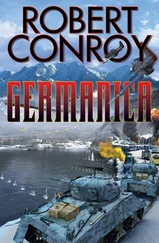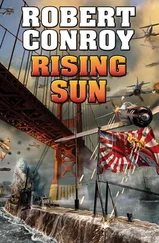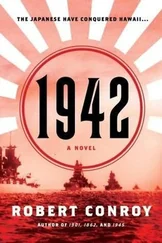Robert Conroy - Red Inferno
Здесь есть возможность читать онлайн «Robert Conroy - Red Inferno» весь текст электронной книги совершенно бесплатно (целиком полную версию без сокращений). В некоторых случаях можно слушать аудио, скачать через торрент в формате fb2 и присутствует краткое содержание. Жанр: Альтернативная история, на английском языке. Описание произведения, (предисловие) а так же отзывы посетителей доступны на портале библиотеки ЛибКат.
- Название:Red Inferno
- Автор:
- Жанр:
- Год:неизвестен
- ISBN:нет данных
- Рейтинг книги:4 / 5. Голосов: 1
-
Избранное:Добавить в избранное
- Отзывы:
-
Ваша оценка:
- 80
- 1
- 2
- 3
- 4
- 5
Red Inferno: краткое содержание, описание и аннотация
Предлагаем к чтению аннотацию, описание, краткое содержание или предисловие (зависит от того, что написал сам автор книги «Red Inferno»). Если вы не нашли необходимую информацию о книге — напишите в комментариях, мы постараемся отыскать её.
Red Inferno — читать онлайн бесплатно полную книгу (весь текст) целиком
Ниже представлен текст книги, разбитый по страницам. Система сохранения места последней прочитанной страницы, позволяет с удобством читать онлайн бесплатно книгу «Red Inferno», без необходимости каждый раз заново искать на чём Вы остановились. Поставьте закладку, и сможете в любой момент перейти на страницу, на которой закончили чтение.
Интервал:
Закладка:
Robert Conroy
Red Inferno
CHAPTER 1
The hastily gathered flotilla of small motor launches plowed through the calm water of the Elbe River as their outboards churned toward the rapidly closing enemy-held ground ahead. The helmeted men inside the collection of small boats hunched down, as if willing themselves to be invisible and, thus, out of harm’s way.
This was when soldiers were the most vulnerable, and the tightly packed men in each of the dozen assorted craft knew that a hit anywhere would impact on something soft, meaty, and human. In a perverse and illogical way, the American soldiers hoped they would be opposed only by rifles and machine guns. Anything, they thought, but the damn German 88 mm antitank guns that could instantly turn their frail craft into flaming coffins.
But where were the Germans? The April morning was clear and the GIs knew the little boats must stand out vividly to enemy eyes that must be watching them. Yet the only sound they heard was the roar of the straining motors and the splash of the waves only inches below the freeboard. The launches were overcrowded, with almost twenty stuffed into some of them. The men themselves were strangely silent. This was water. Their environment was land. Afloat, they felt useless. On land you could dig a hole and hide, or even run, but what the hell did you do on water?
Soldiers would look up and glance forward, trying to pick out the places where terror would emerge but saw nothing frightening. The German countryside was green and friendly, like something from a postcard. Where could there be terror? At this crossing point, the Elbe was less than a quarter mile of blue-green water. Yet it might as well have been the English Channel for the fear it caused.
“Lieutenant, get your head down,” yelled Sergeant Jack Logan. “Please,” he amended, belatedly conscious of the difference in their ranks and that he shouldn’t show up any officer, even a brand-new replacement like Second Lieutenant David Singer.
“I wanna see, Sarge. I wanna be the first Jewish officer east of the Elbe and maybe the first in Berlin.”
The young sergeant chuckled and a few of the other men nervously joined in. Sergeant Logan was big for an infantryman, nearly six feet tall, stocky and muscular, and with a shock of red hair that was kept out of view by his helmet. He had open, even features, and some, particularly his mom, described him as having a “friendly” face, whatever the hell that meant. He certainly wasn’t friendly with a rifle in his hands. Logan contrasted sharply with the shorter young officer’s pale skin and thin blond hair. Lieutenant Singer would be bald before he was forty.
Logan liked young Lieutenant David Singer. He had arrived only a couple of days earlier and was replacing another young lieutenant who’d gotten badly wounded. It was hard to realize that he, the old man of the platoon, was only a year older than the lieutenant’s twenty-three years. War had such a wonderful way of aging its participants.
“Can this thing go faster?” came a lament from the rear of the launch. Logan thought the voice was Crawford’s, but he couldn’t tell.
Lieutenant Singer responded. “If you want, you can get out and push.”
This was greeted with a few more nervous giggles and an offer to paddle with helmets. The jokes were stupid, but they broke the tension. Anything to hide the fact that they could be dead in an instant.
The water shallowed and the boat slowed, finally crunching up on the mud embankments. The men hurled themselves from their unwelcome craft and ran up the low embankment, fanning out like the veterans they were.
There was no need for either Singer or Logan to give any orders, and the two men prudently concentrated on staying out of everyone’s way. To his left and right the other craft disgorged their human cargoes as well. In a matter of moments, almost half of D Company was safely across and forming a defensive perimeter.
The commandeered boats began their return to the west bank of the Elbe and would return again and again with more and more soldiers. On the far shore, engineers were assembling a pontoon bridge.
Singer fidgeted with his rifle. “Sergeant Logan.”
“What, sir?”
“Where are the Germans?”
Logan took off his helmet and wiped his head quickly before replacing it. He had this unreasonable fear that his red hair could be seen from quite a distance and, therefore, made a great aiming point. When he didn’t have a helmet on, he made certain he wore a cap. Regulations said a soldier had to wear headgear when outdoors, although a lot of men ignored the rule. Not Logan. He always wore something on his head.
Lead elements of the 54th Infantry Division were across the Elbe River and, if the reports were true, there was nothing but green grass and woodland between them and Berlin and, just maybe, an end to the war.
“Doesn’t look like they mind us being here, now do they sir?”
This was totally unlike a crossing of the river a couple of days earlier when elements of the 2nd Armored Division had run into stiff resistance at Magdeburg, and had returned to the western shore before crossing a second time and establishing a beachhead. On the other hand, the 83rd Infantry at Barby had crossed some lead elements unopposed, just like this.
Logan squatted on the ground and Singer plopped down beside him. Logan was the platoon sergeant, and to the woefully inexperienced Singer he was not only friendly, but knowledgeable and willing to share that hard-learned knowledge. Young lieutenants were sometimes ignored by the veterans. Lieutenants had to earn the respect of their men.
Singer grinned sheepishly. “I can’t say I’m disappointed. Some others might be lusting for their first time in combat, but it wouldn’t bother me if we postponed it for a very long time. Like until I was ninety-seven.”
Logan chuckled. “Count me in on that.”
He looked about and satisfied himself that his men were in proper position. He then took out his entrenching tool and began to dig yet another hole in the sacred land of the Third Reich. They had safely crossed the Elbe and, if his knowledge of European geography was not too far off, were only about sixty miles from Berlin. He had heard the rumors that they would go on toward the German capital, but he’d also heard rumors that they would be held back so the Russkies could have a little revenge on the Nazis.
With a little luck, Logan thought, he and his men could stay here forever and the Germans would continue to ignore them. With a little more luck the war would be over in a few days or a few weeks at most, and then he could begin to worry about stuff that was really important, like going home, finishing school, getting a job, and getting laid. Not necessarily in that order.
Logan also knew that someone killed on the last day of a war was as dead as someone killed on the first. As the war seemed to draw to its inevitable conclusion, there was a concerted effort on the part of his men to avoid becoming that last man. They weren’t cowards or failing to do their duty, it was just that no one wanted to die, especially now. The war was almost over and they would be going home soon-unless they had to fight the Japs, and that would really be for shit. But no, he thought, concentrate on staying alive and getting home, and let the future take care of itself. The hell with heroes, was the watchword. Don’t die in Germany. Not now.
Logan glanced behind him to where another load of soldiers was about to land as the small craft continued their shuttle. Soon they would be too strong a force to dislodge except by a major attack, and the Germans seemed to have too little left for that to occur. By the end of the day the engineers would have at least one pontoon bridge across the river, and some armor would have been brought over, and maybe artillery too if the Germans did decide to show up.
Читать дальшеИнтервал:
Закладка:
Похожие книги на «Red Inferno»
Представляем Вашему вниманию похожие книги на «Red Inferno» списком для выбора. Мы отобрали схожую по названию и смыслу литературу в надежде предоставить читателям больше вариантов отыскать новые, интересные, ещё непрочитанные произведения.
Обсуждение, отзывы о книге «Red Inferno» и просто собственные мнения читателей. Оставьте ваши комментарии, напишите, что Вы думаете о произведении, его смысле или главных героях. Укажите что конкретно понравилось, а что нет, и почему Вы так считаете.












